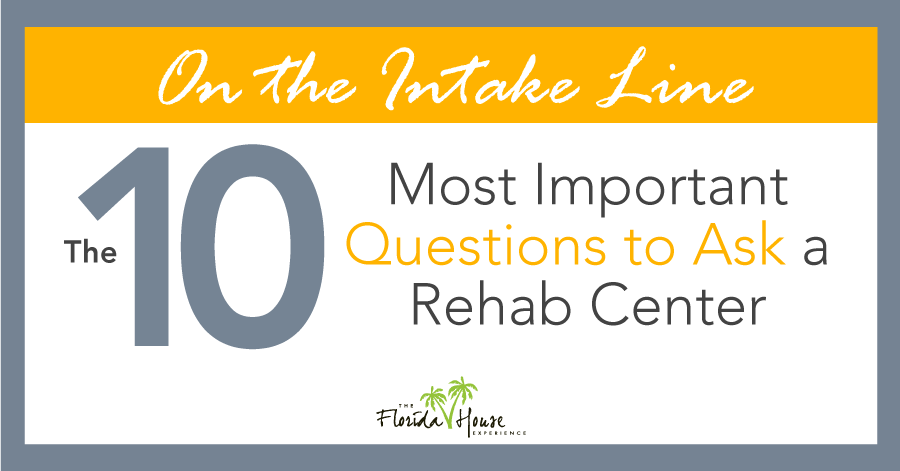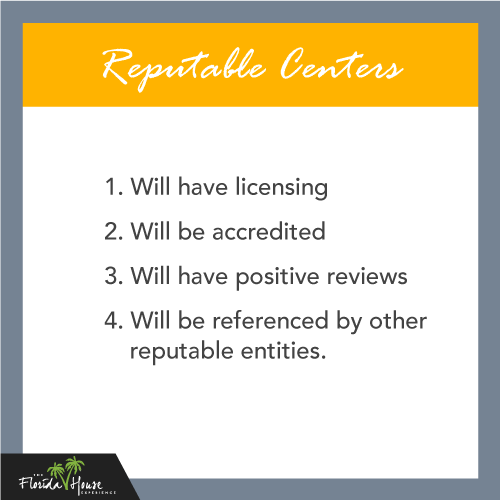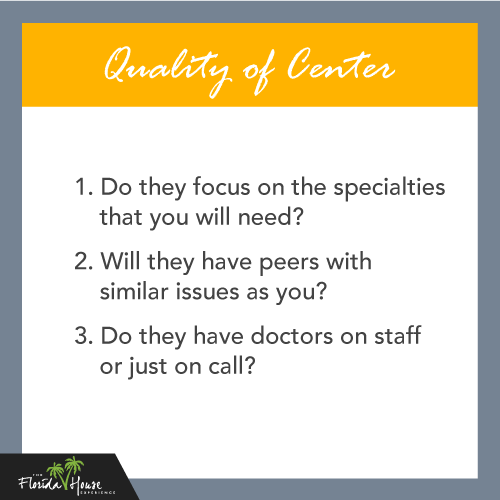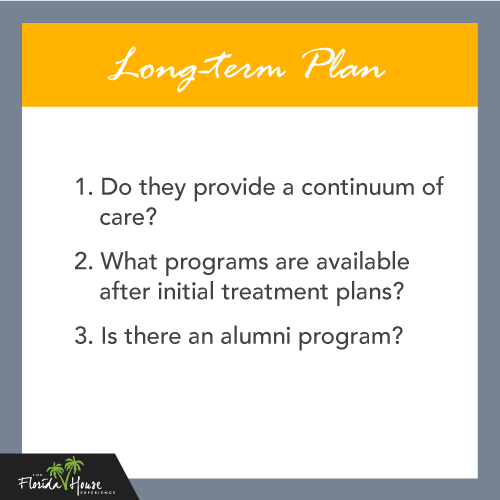
You’ve decided it’s time to take control of your life and check yourself into a rehab center. Now it’s time to choose the right treatment facility — one that offers the right combination of services, support and quality assurances to ensure you get the help you need. Here are the top 10 questions you need to ask when you call a rehab center intake line.
Questions to ask Residential Treatment Facilities:
1. Is Your Rehab Center Licensed and Accredited?
 While there are a lot of great rehab facilities out there, unfortunately, there are also a lot of fly-by-night organizations that operate unlicensed sober living homes and residential treatment centers.
While there are a lot of great rehab facilities out there, unfortunately, there are also a lot of fly-by-night organizations that operate unlicensed sober living homes and residential treatment centers.
In the United States, virtually anyone can claim to be a drug and alcohol expert, open a rehab center and accept clients. There simply aren’t any federal standards in place, although some states such as Florida do have licensing requirements for treatment centers, largely focused on the physical safety of the facility.
The “gold standard” with regards to the quality of programming offered at a rehab center is accreditation through the Commission on Accreditation of Rehabilitation Facilities, or CARF. This international, non-profit organization screens rehab centers for compliance with client safety standards and performance outcomes, and it states that “providers that meet our (CARF) standards have demonstrated their commitment to being among the best available.”
2. Do You Deal With Dual Diagnosis?
According to the National Alliance on Mental Illness, approximately 10.2 million American adults struggle with both a substance abuse issue and one or more concurrent mental illnesses. That means that just over half of all addicts in the U.S. are dealing with a dual diagnosis that includes conditions such as crippling anxiety, depression and post-traumatic stress disorder (PTSD) that people often try to deal with by self-medicating using alcohol, over-the-counter medicines and illegal drugs.
Treating concurrent substance abuse and mental health issues at the same time dramatically improves treatment outcomes by addressing all of the physical, psychological and emotional factors influencing both the addiction and the mental illness.
3. What Payment Options Are Available?
 Many insurance plans will cover at least a portion of the treatment cost at a licensed and CARF-accredited rehab facility; however, you will usually need to get pre-authorization from your insurance provider.
Many insurance plans will cover at least a portion of the treatment cost at a licensed and CARF-accredited rehab facility; however, you will usually need to get pre-authorization from your insurance provider.
Be sure to ask the rehab center what payment options are available so you won’t have the added stress of worrying about how you’ll cover the costs once you enter a program. In some cases, patients may be eligible for subsidies or medical loans through an approved third-party medical lending company.
4. Can You Provide Me With Client References?
Ask if the rehab facility can provide you with client testimonials from patients who have completed their program. Reading about the experiences other people have had with a particular treatment center can help you gain insight into what you can expect and whether it’s the right treatment center for you.
5. Do You Offer Speciality Programs?
While some rehab centers simply offer a one-size-fits-all program, others like FHE Health recognize the value in providing special programs geared toward specific client groups. This can include programs for first responders, women, older adults, and people dealing with gambling addictions in order to address the unique needs of each of these groups.
6. Who Is on the Clinical Team?
 A strong, well-balanced clinical team is a sign of a high-quality rehab center. Ask about the education and experience of key staff members — specifically, the people who are responsible for direct patient care, counseling and treatment planning. These are the professionals you’ll be counting on to provide you with the day-to-day services and support you need to address your substance abuse issues, so it’s important that you feel comfortable and confident in their clinical abilities.
A strong, well-balanced clinical team is a sign of a high-quality rehab center. Ask about the education and experience of key staff members — specifically, the people who are responsible for direct patient care, counseling and treatment planning. These are the professionals you’ll be counting on to provide you with the day-to-day services and support you need to address your substance abuse issues, so it’s important that you feel comfortable and confident in their clinical abilities.
7. How Long Does the Inpatient Program Last?
While some rehab centers have strict timelines for their inpatient programs, other treatment facilities use more of a patient-centered approach to determining the length of stay for individual clients. Other programs, like FHE, offer a range of short and long term programs that last from five days to six months, depending on the needs of each individual.
8. What About Medical Care During Rehab?
If you’re like many people dealing with a substance abuse issue, you may also be managing medical conditions such as diabetes, heart problems, cancer or HIV/AIDS. Be sure to inquire about in-house medical services at the rehab center, including whether or not you will have to leave the facility to see a doctor or if one is available on-site.
9. Do You Offer Aftercare Services?
Substance abuse disorder is a chronic, lifelong condition, one that isn’t cured at a rehab center. That means you will need to continue with your recovery journey once you complete a treatment program.
Ask whether or not the rehab center offers an aftercare program or alumni services where you can connect with other clients who are focused on sober living. Inquire about resources such as life skills groups, help with getting a job and any support for finding safe, sober housing after graduation from the treatment program.
10. What Is the Facility Like?
As you research treatment centers, chances are good you’ll discover that while some rehabs look like a 5-star resort, others are completely utilitarian and offer nothing more than the basics when it comes to accommodations, food, and services.
Be sure to ask questions about the environment of the rehab center — things like what the rooms are like, what types of recreational facilities are available and whether you’ll be expected to participate in chores such as cleaning and meal preparation.
Have Questions About FHE Health? We’re Here 24/7
Choosing a rehab facility that fits your needs is critical to your success. Here at FHE Health, our team of friendly, knowledgeable intake experts is available to chat online or take your call 24 hours a day, seven days a week about our residential treatment programs. We’re happy to answer any questions you have about us, our treatment center and the services we offer. Call now.






